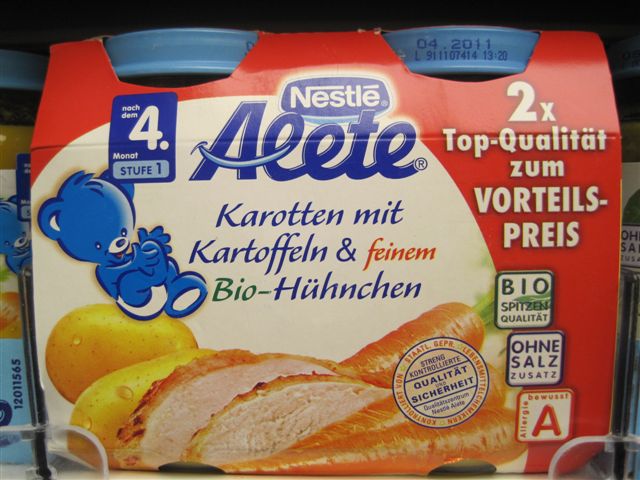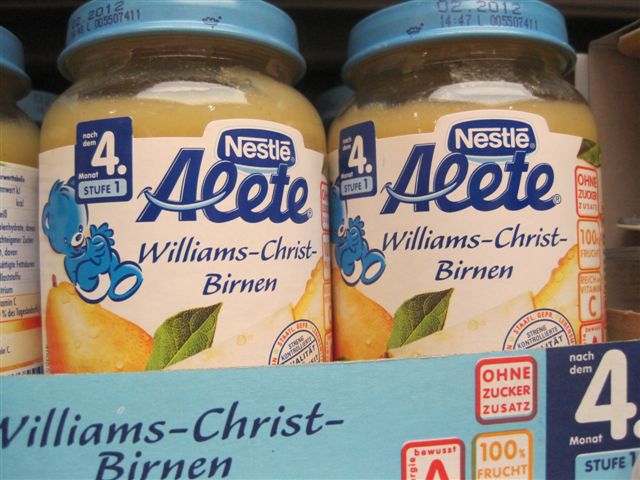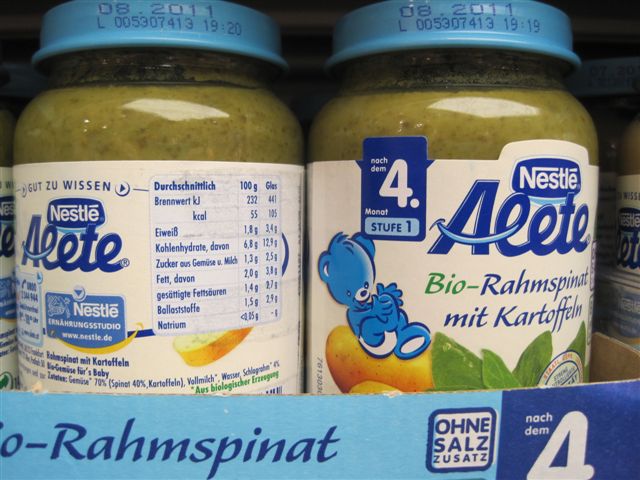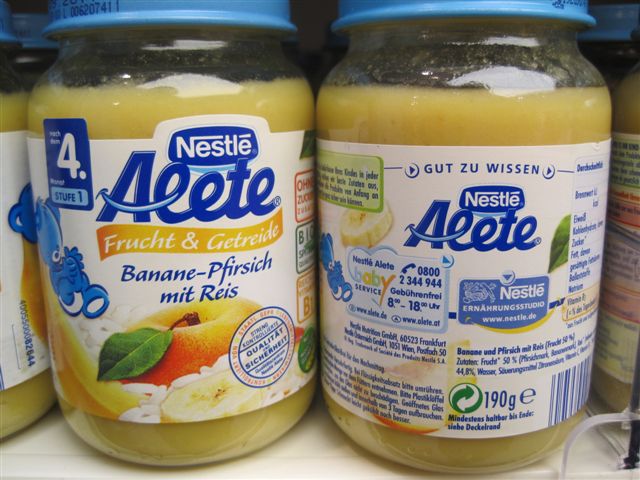More evidence you can't believe a word Nestle says
 Saturday, May 8, 2010
Saturday, May 8, 2010 I asked Nestle whether it markets any complementary foods (i.e. baby food, cereals, etc.) for babies under 6 months of age. Nestle answered that:
Nestlé fully supports the May 2001 WHA Resolution 54.2 which changed the recommended duration of exclusive breastfeeding from 4 – 6 month to 6 months, thereafter introducing complementary foods while recommending continued breast feeding for as long as possible. Thus we implement this resolution in the same way as we implement the WHO Code and we have completed label changes on complementary foods to follow the 6-months recommendation.
Today I was shopping at one of the largest dm Drogeriemarkt stores in Berlin. They have a huge baby food section, which includes a huge selection of Nestle Alete baby food. Most of the food (not just some of it, not just an exception, not just old stock, not just starter cereal even) was labelled as being appropriate to start at 4 months of age.
The food labeled as appropriate after 4 months included:
carrots and potatoes
Combinations of beef, carrot potato or pork, parsnips and potato.
Pears
Creamed spinach with potatoes (which includes whole milk as an ingredient)
Bananas, peaches and rice
Garden fruits
Beyond the photographic evidence, Nestle Alete's German website clearly demonstrates that this isn't just a labeling issue. In its information for parents on infant nutrition, the page on Stage 1, starting after 4 months, includes the following introduction:
ORIGINAL GERMAN: Strampeln, Strecken, Greifen – je aktiver Ihr Baby wird, desto mehr Energie braucht es. Ihre Muttermilch bzw. das Fläschchen bleibt zwar erstmal Nahrungsgrundlage. Doch nach dem 4. Monat genügt das allmählich nicht mehr, um Ihr Kleines mit allem Nötigen zu versorgen. So rückt der große Moment näher: Das erste Löffelchen!
ENGLISH TRANSLATION: Kicking, stretching, grabbing - the more active your baby gets, the more energy he needs. Your breast milk or infant formula continues to provide the basic nutrition for your baby. But starting at 4 months, it is no longer sufficient to provide your little one with everything he needs. That means the big moment is approaching: The first spoonful!
The labels and the website information makes it 100% clear that in Germany Nestle has not completed label changes on complementary foods to follow the 6-months recommendation or done anything else to demonstrate its support of the this recommendation. In fact, they continue to tell women that breastmilk is no longer sufficient after 4 months of age.
Not only does this show that they clearly do not support the WHO resolution changing the duration of exclusive breastfeeding to 6 months (despite their claim that they do), but it also calls into question whether you can believe anything else that they say. If they would and have lied about something that can be so easily verified by walking into any store selling Nestle baby food in Germany, what wouldn't they lie about?



























Reader Comments (74)
This actually says that the porridge is for when babies are "ready for weaning" and goes on to state that there is age variablity for weaning--yes there is but that would be in YEARS!!! Maybe one baby weans in third year and another in their fourth or fifth.... they specifically mean that a baby needs this cereal for 4+ months as they wean. I have been boycotting nestle since my oldest was born in 1990 and have no plan to stop or to stop talking about it.
How do these people sleep at night?
And when that food is found to be tainted, or full of things you don't want or didn't think was in your food, and you say, why didn't anyone say anything? Remember this moment, Betty Boop. Not all of us are blind consumers simply accepting everything corporations tell us at face value.
that just disgusts me. wtf, nestle??!!
thank goodness for people like phdinparenting who care not only for the welfare of her own children, but for the welfare of all children. thank you, phd, for continuing to put pressure on companies such as nestle so that they don't mislead parents and put children at risk all in the name of the almighty $ (or deutschmark).
[...] and baby food labelling Interesting article More evidence you can’t believe a word Nestle says | PhD in Parenting Nestle untrustworthy? Noooooo..... Sure..... Melinda Reply With Quote [...]
In fact, the current European law (unfortunately) allows baby food manufacturers to label their products as being appropriate from 4 months, despite the WHO Code. That's why you will find the same food labelled as being appropriate as of 4 months in Europe but as of 6 MONTHS in countries in Africa. Mind-boggling isn't it?
Disgusting. I just don't understand how anyone can believe anything Nestle says. Thanks for the good reporting.
I'm a little confused by this. I know are WHO guidelines for advertising and promoting baby foods but is having that product on the shelf for sale in a store really the same as running an ad for it? I don't think so. I also wonder if Germany has laws/rules/guidelines that are different from the UN's? And finally is Nestle the only baby food company creating food for children 4-6 months of age? I gabbed a box of Beech Nut Rice cereal from my pantry and the label says "cereal from about 4 months" how is that better/worse than what you're seeing for sale in Germany? Finally, say you are a mom who chooses/can't breast feed your child and doesn't want to make your own baby food - how do you know what to buy to feed your child if the age guidelines aren't on the package? I don't work for a baby food company. I studied the baby food being pushed in the 3rd world problem as a case study in college before the UN and WHO created the guidelines. I was very happy when they did. My only experience with buying baby food is to use it to make food and treats for my dog who has food allergies so my guidelines and experience with it are totally different than if I had a real human child. That's why I'm asking a bunch of questions.
Condo Blues:
There are two issues here:
1) The WHO (not the UN) and other major health bodies around the world agree that infants should be given nothing but breast milk (or infant formula) until they are 6 months of age. As a result, the WHO guidelines say that no food or drink can be marketed for babies under 6 months of age. That would include labeling on the products, information on their website, or advertising in the media. The only approved alternative to breast milk prior to 6 months is infant formula and it can be sold, but not advertised/promoted. These are international guidelines that some, but not all, countries have made into law. It is not law in Germany, Canada or the United States.
2) Despite it not being law, Nestle says it agrees with the WHO resolution that no complementary foods (e.g. baby food) should be given to babies under 6 months of age. It said that it had changed the labels on its food worldwide to reflect the 6 month recommendation. However, it obviously lied about that fact since its labels very clearly still mention that these foods are for babies under 6 months of age. That was the key point of this post. It is already obvious that Nestle goes against the WHO recommendations and does so around the world. However, it claimed that in this instance it WAS following their recommendations. However, it is not.
Sorry...just realized I didn't directly answer your question. It is not a problem for companies to indicate an age on baby food. It should just NEVER say anything under 6 months. Whether the baby is breastfed (which is ideal) or gets infant formula, no other food or drink should be introduced until 6 months.
Also, for what it's worth, moms who do not want to make baby food and don't want to buy commercial baby food ,can just give their babies (as of 6 months) small, soft pieces of regular food. No need for baby food at all. It is a convenience product.
I agree that if Nestle said that it changed it's food labels to indicate 6 months and above in all countries that they sell it in than that's what the label should say. But a quick Google search on my part showed that there were many differing professional opinions on whether a child should eat something other than breast milk or formula starting at either 4 months or 6 months. I think that decision (or not) should be up to the child's parents and health professionals. This may be why this isn't regulated or a law in the US, Canada or Germany like The Globetrotter Parent said in her comment.
A picky point (can't help it. At one time I considered working for the UN and know a lot about it.) The World Health Organization (WHO) is part of the United Nations (UN.) It can pass resolutions that are recommendations that member countries may choose to follow - some countries do not. Since membership in the UN is voluntary, unfortunately complying with its resolutions and those of it's subcommittees like the WHO is also voluntary. And just like any in member country's political infrastructure sometimes UN resolutions are passed purely based on internal politics.
The WHO infant formula guidelines and recommendations (again, all voluntary to follow with no penalty for not following them except for another member country saying something about it during a meeting) where initially passed to protect the largely illiterate populations in third world countries who did not have ready access to the information and tools to do their own research on how, what, when, and why they could consider breast feeding vs. formula for their children often with dire results when mothers tried to water down the formula to make it last. These women didn't have ready access to the information that they shouldn't do this under any circumstances because so many of them couldn't read it or they misinterpreted the pictures on the packaging/ad. Tragic because just because these parents may not read doesn't mean that they don't love their children any less than someone who can.
This may be another reason why you may find the same food being labeled as appropriate for 4 - 6 months in Europe, the US and Canada but labeled as appropriate for 6 months in countries in Africa.
I also agree with you that moms who don't want to buy commercial baby food can just puree or smash soft pieces of regular food. Although I will give you that buying baby food in a jar is convenient that's why I use it for a totally different purpose.
Condo Blues:
The reason that there are many differing professional opinions on whether a child should have anything other than breastmilk (or alternatively formula) before 6 months is that the recommendation changed not that long ago and it takes a LONG time for governments, health professionals, etc. to change their approaches. The World Health Assembly changed its recommendation in 2001. Health Canada, after reviewing the WHA resolution and doing its own analysis of existing research, http://www.hc-sc.gc.ca/fn-an/nutrition/child-enfant/infant-nourisson/excl_bf_dur-dur_am_excl-eng.php" rel="nofollow">updated its recommendation in 2004. In the United States, the http://www.aap.org/advocacy/releases/feb05breastfeeding.htm" rel="nofollow">American Academy of Pediatrics updated its policy in 2005.
There is a lot more information on other world health organizations that support this recommendation and the reasons behind it on the http://www.kellymom.com/nutrition/solids/delay-solids.html" rel="nofollow">kellymom website's page on introducing solids.
I agree that the WHO infant formula recommendations were initially passed to protect babies in third world countries from the unethical actions of formula companies. However, the issue of when to introduce solid foods is related primarily to the increased chance of gastrointestinal infections, which is something that affects both populations in the developing and the developed world. There is no good reason to give your baby anything but breastmilk (or alternatively formula) before the 6 month mark. The only reasons for doing so would be ignorance of the new recommendations, corporate profit or parents impatience (i.e. can't wait to see their kid eat stuff).
Well, but technically "weaning" begins as soon as anything besides bm is introduced, weaning means moving from one thing to another, not just the end of bf. But I don't disagree, their marketing is deplorable. No matter the exact translation, the big fat 4 on the package says it all.
To be fair, no they don't all spit it out. When my first was born, the reco here in Canada was still 4-6 months and we started solids at 5 months: he most definitely didn't spit out a spoonful! On the other hand, we knew more with our second, and the reco was 6 months by then, so we waited even though he showed signs of being ready earlier. But even after we offered solids, he wasn't much interested until 7-8 months (and not at all in mush). They are all different, though I think it's better to err on the side of later rather than earlier, knowing what we know now. And yes, baby spitting food out or needing to be reclined should be a pretty good indicator of "not ready"!
Umm, no. Most babies can sit in a high chair or booster seat and be fed with a spoon by then, quite easily....and they actually like the food.
The original reason behind starting solid food early, when most babies were breastfed, was to supplement inadequate milk supply. It is all well and good to insist that everyone can have enough milk, but some women simply don't. No big deal, I've known farm animals who I wouldn't rebreed due to that very problem...and we don't breed people for milk production. Solid food was safer than the inadequately clean milk supply of the era, unless you had your very own cow.
By the time mine were a bit past 4 months, they were happily scooting around eating dog food out of the bowl...I doubt a couple bites of carrots did irreparable harm!
[...] the news is the same here as it is Germany or in Canada, or wherever PhD in Parenting is still fighting the good fight: Nestle [...]
Actually, at 4 months, my oldest sat independently, had teeth and could chew. She was totally OFF the charts, though, and likely the exception. And, btw, still nurses occasionally at 4.5 years, 4' tall, and 60 pounds!
Wow. Let's see how the list of huge corporations we can't trust -- Nestle, BP, Halliburton, pretty much everyone on the financial sector. Maybe I should start writing them all down, especially when they testify in front of Congress about what good citizens they all try to be. 'Cause they are citizens now, according to the Supreme Court. Yeah, they're on my list, too.
[...] and continues to push complementary foods from too early an age. A recent example was given on the PhDinParenting blog a couple of weeks [...]
The day you wrote this article, is the day we went back to the US after visiting the Netherlands for a few weeks. I encountered the same thing in te grocery stores there when trying to find some babyfood for my 8 month old. Not only did I see the Nestle products you display above, but there were plenty of jars from the storebrand (largest chain in Holland) with "4+" on it as well. It was nearly impossible to find cereal without cow's milk in it as well.
Honestly though - at least they are straightforward. In the US, sneakier tactics are used... Stage 1 for 'supported sitters' anyone? Plenty of babies can sit 'supported' before 4 months, and pediatricians do not shy away from telling parents to start introducing 'first foods' between the ages fo 4 and 5 months.
I could send you pics of the jars if you would like.
By the way, are WHO guidelines (no food should be marketed for ages under 6 months) binding?
[...] or missing information in their responses. Since then, I have continued to write a variety of posts on issues related to Nestlé and on my decision and the decision of others with regards to the Nestlé [...]
[...] More evidence you can’t believe a word Nestle says (PostRank 7.9) [...]
Seriously? I myself, my children, and now my granddaughter have been raised on Alete and there are no problems! Why don't you fight a fight worth fighting?